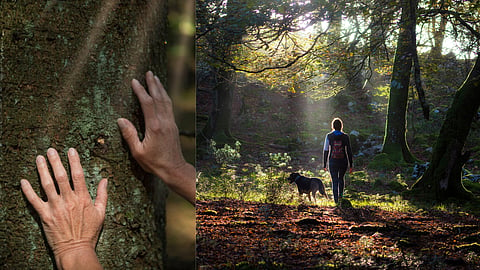
- HOMEGROWN WORLD
- #HGCREATORS
- #HGEXPLORE
- #HGVOICES
- #HGSHOP
- CAREERS
- ABOUT US
- CONTACT US

Heaving under a deadweight economy brought to its knees by war reparations, Japan in the late 60s was engineering the hustle culture that has peaked in the new millennium, and commanding an artillery of relentless workers ready to clock in more than 12 hours for six days a week. It was only in the 80s that karoshi or 'death by overwork' began to gain nationwide momentum and hotlines were set up for companies dealing with their employees succumbing to heart attacks at their desks.
Away from the din and turmoil of city life, the legendary bay trees and oaks of their woodlands provided a solace to the Japanese breadwinners that heralded the nature therapy of shinrin-yoku or ‘forest bathing’ as it is called today, whence fatigued bodies would submerge in the ceaseless green shadows and recover their humanity.
Embracing beech trunks with sinuous arms, their cortisol levels dropped and when their noses picked up the terpenes floating amidst the foliage, a new vigour started coursing through their veins.
Cocooned in our condos and automobiles, most of us have lost contact with the ways of the wild and it would be nothing short of dangerous to venture into the great outdoors without at least a basic understanding of navigation and survival skills. For a more holistic experience, nowadays you can attend trained guides promising a rejuvenating two- to three-hour ecotherapy expedition. Spending about two hours a week in nature is considered a revolutionary panacea for stress. Copious number of studies have shown that shinrin-yoku has real health benefits. It is known to reduce blood pressure, calm down an overexcited nervous system and enrich the immunity.
India has been steadily losing forest cover in the past 30 years, faster than any other country, barring Brazil. However, there are still a number of sacred groves and national parks including Tamenglong in Manipur, Cherrapunji in Meghalaya, Agumbe in Karnataka, Khajjiar Sanctuary in Himachal Pradesh among others that are thriving in our country where we could bridge the gap between us and the natural environment.
Founded in 2018, Forest Therapy India is a homegrown endeavour by certified forest bathing guide Dipika Sinha who perceived the value of reintroducing people to the nourishment only nature can impart. In her prior experience with responsible tourism, she identified the need to help travellers become more conscious of their environment and treat it with respect. Following her training at the European Forestry Institute in Ireland, Dipika began leading families and corporate teams on birdwatch tours and purification rituals deep within the Himalayan foothills of Uttarakhand.
Shinrin-yoku is not like exercise, hiking or hunting. It is simply the process of being outdoors, awakening all your five senses and basking in birdsong, the crackling of the dry twigs under your feet and breathing in the antimicrobial phytoncides released by leaves for some natural aromatherapy. Settling down for an intimate lunch under the overarching behemoths of old growth forests or languishing along the banks of a gushing river, Dipika Sinha will often encourage her tour groups to practise mindfulness and tune into the vibration patterns of the trees.
Borrowing a trick or two from the Iceland forest department, the Chief Conservator of Forest Research, Sanjiv Chaturvedi inaugurated India’s first forest healing centre in March 2021 at Ranikhet (Uttarakhand). Predominantly coniferous, this 13 acres straggle of vegetation maintains a log of all the people who stumble in here, looking for a meaningful experience. The salubrious effects of the pine-needles can last for weeks, rich in vitamin C and antioxidants, and releasing alpha-pinene known for its broncho-dilating reaction that literally helps you breathe better. There are also earmarked areas called 'tree platforms', expressly built for forest meditation and sky gazing. Visitors are advised to leave behind their cameras or any other distractions so they can truly soak in the healing.
For those looking to pamper themselves beyond a healthy jaunt in the woods, the Dharana Wellness Retreat offers pranic healing and guided forest meditation at their eco-conscious facility in the antediluvian Shillim valley, flanking the Sahyadri mountains. Featuring a meditation cave, relaxation centre and yoga pavilion, this wellness centre is popular for being the exemplary spa getaway that synergises ayurveda, nature therapy and luxurious self-care. The notion that one needs to check in to a place like this, as pampering and restorative as it can be, just to feel at one with ourselves again is hard testimony for how far we've strayed from the auspices of Mother Nature.
The asphalt jungle we raised from the earth for human beings to drive around and feel safe in has now begun to thrust us back into the woods. The unceasing stimulation of urban life, according to psychiatrists, is being studied for possibly inducing anxiety and mood disorders. What’s more, with the rising pollution and overcrowding in cities, a work-from-home generation is beginning to de-urbanise to save on living costs and settle down in small towns, closer to untamed wilderness.
Once you begin to forest-bathe more regularly, you will realise that it doesn't take a lot to let nature make its way back in. All you have to do is find a local park or garden, wander listlessly through the bushes and let your body be the guide. Trust your feet to find their roots again.
If you enjoyed reading this, here's more from Homegrown:
Visit A Luxury Ayurvedic Wellness Retreat In The Serene Forests Of Uttar Pradesh
India To Spend Rs. 40,000 Crores In A Bid To Increase Forest Cover
